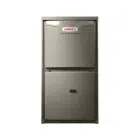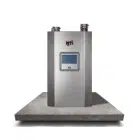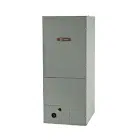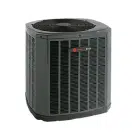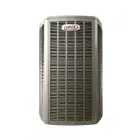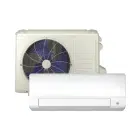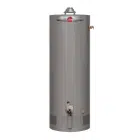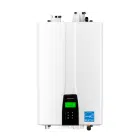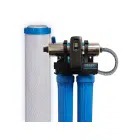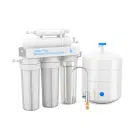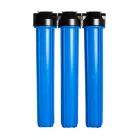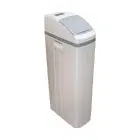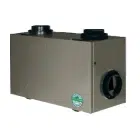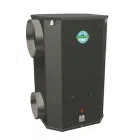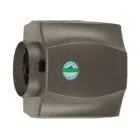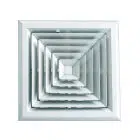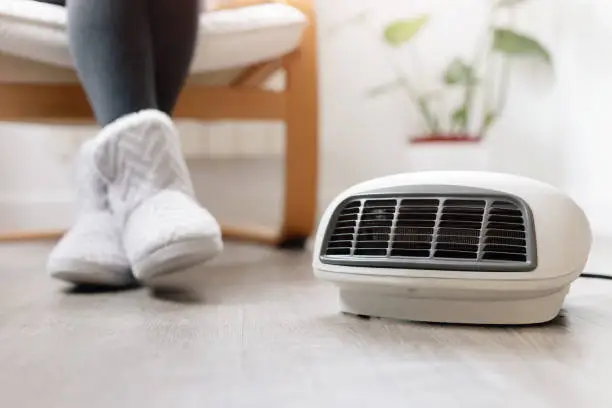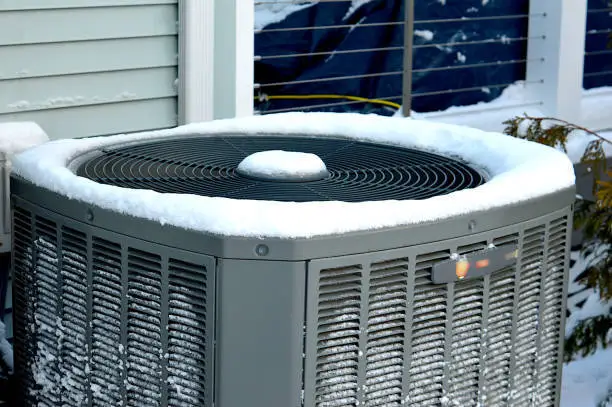
Table of Contents
In the ever-evolving world of home appliances, selecting the right home air conditioner is paramount, especially considering the technological advancements and energy efficiency improvements in 2024. This guide aims to assist you in navigating the complex landscape of home air conditioners, ensuring you make a well-informed decision that caters to your comfort and budget.
Understanding Air Conditioners
Types of Air Conditioners
Navigating the variety of home air conditioners available can be daunting, yet understanding the nuances of each type can vastly improve your home’s comfort and efficiency while managing the central air conditioner cost. Here’s a deeper look at the common types:
- Central Air Conditioners: Central systems are the go-to for whole-home cooling, using a network of ducts to distribute cool air efficiently throughout the house. They’re ideal for larger homes or spaces where consistent indoor climate control is desired. While the initial setup and central air conditioner cost can be higher compared to other types, their efficiency and value shine in larger spaces where uniform cooling is a priority.
- Window Air Conditioners: These units are compact and designed to fit in standard window frames. They’re perfect for cooling single rooms or small spaces and are popular due to their relatively low upfront cost and ease of installation. However, they might not be the most energy-efficient option for cooling larger areas, and their placement can be limited by window sizing and location.
- Portable Air Conditioners: Offering mobility and convenience, portable air conditioners can be moved from room to room, providing targeted cooling where it’s needed most. They vent through a window and can be a great solution for spaces where window or central air conditioners are not feasible. While versatile, they often consume more energy for the amount of cooling provided compared to window or central units.
- Split System Air Conditioners: These systems consist of two main components: an outdoor compressor/condenser and one or more indoor air-handling units. They’re connected by a conduit, which houses the power cable, refrigerant tubing, and condensate drain. Split systems offer a balance of efficient cooling without the need for ductwork, making them suitable for homes or rooms where duct installation is impractical. They provide quieter operation and better energy efficiency compared to window or portable units and allow for a more aesthetically pleasing interior appearance.
- Ductless Mini-Split Air Conditioners: A variant of the traditional split system, ductless mini-splits offer similar benefits but are particularly well-suited for retrofitting in homes without existing ductwork or in individual rooms. They provide individualized temperature control, allowing for different settings in separate areas, which can lead to energy savings by cooling only occupied spaces.
Technology Updates
The year 2024 has ushered in groundbreaking advancements in air conditioning technology, propelling efficiency, control, and user experience to new heights:
- Enhanced Energy Efficiency: Modern air conditioning systems have made significant strides in energy efficiency, boasting higher SEER ratings. This not only helps reduce the central air conditioner cost in terms of monthly bills but also lessens the environmental footprint.
- Smart Controls: With the rise of smart home technology, home air conditioners have become more intelligent. Users can now control their systems via smartphones, set schedules, or integrate them with other smart home devices. This convenience and control can lead to more efficient use and energy savings.
- Eco-Friendly Refrigerants: As part of the global effort to reduce greenhouse gas emissions, newer air conditioners use refrigerants that have less impact on the environment. These advancements contribute to the sustainability of the cooling solutions and align with international environmental standards.
- Variable Speed Technology: Air conditioners with variable speed compressors adjust cooling output more precisely, maintaining comfort levels more consistently while using less energy. This technology can significantly reduce electricity usage compared to traditional fixed-speed compressors.
- Advanced Air Filtration: With an increased focus on indoor air quality, modern home air conditioners come equipped with superior filtration systems that remove pollutants, allergens, and pathogens, ensuring cleaner indoor air and contributing to the occupants’ health and well-being.
Feel free to reach out to HVAC Service Solutions, and let our experts assist you in finding the perfect air conditioner that meets your specific needs and preferences.
How to Choose the Right Air Conditioner
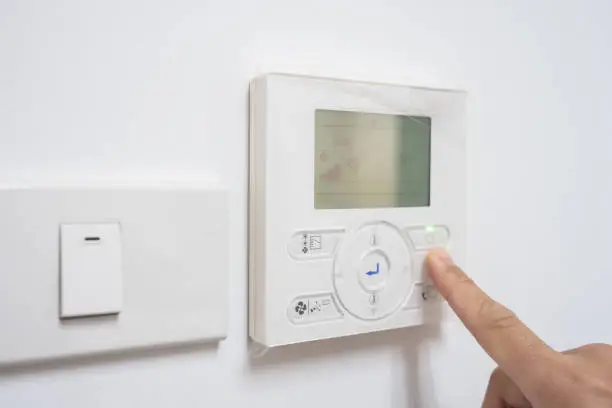
Choosing the right air conditioner involves several key considerations to ensure you find a unit that not only cools your space effectively but also operates efficiently, fits your budget, and meets your specific needs. Here’s a detailed guide to help you make an informed decision:
Assessing Your Needs
- Evaluate Your Space: The size and layout of your space are critical factors in selecting an air conditioner. Measure the square footage of the room or house to determine the cooling capacity needed, typically measured in British Thermal Units (BTUs) per hour. A unit that’s too small won’t cool effectively, while one that’s too large can lead to unnecessary energy consumption and uneven temperature fluctuations.
- Consider the Building Characteristics: The insulation quality, window size and orientation, ceiling height, and even the color and material of your roof can influence your cooling needs. Better-insulated homes may require smaller capacity units.
- Understand Different Room Needs: Different rooms might have varying cooling requirements. For example, a sunlit room or a kitchen will typically need a more powerful air conditioner compared to a shaded bedroom.
Energy Efficiency
- SEER and EER Ratings: Check the Seasonal Energy Efficiency Ratio (SEER) and Energy Efficiency Ratio (EER) ratings. The higher the SEER and EER, the more efficient the air conditioner. In 2024, look for units with SEER ratings of 15 or higher for optimal energy efficiency.
- Energy Star Certification: Opt for air conditioners with ENERGY STAR certification. These units have met stringent energy efficiency guidelines set by the U.S. Environmental Protection Agency and the Department of Energy.
- Consider Inverter Technology: Air conditioners with inverter technology adjust the compressor speed continuously, providing precise cooling or heating as needed. This technology can significantly reduce energy consumption compared to traditional fixed-speed air conditioners.
Noise Levels
- Decibel (dB) Levels: Consider the noise level of the air conditioning unit, especially if it will be installed near bedrooms or quiet areas. Look for units with lower decibel ratings to ensure a quieter operation.
- Location of the Unit: The placement of the air conditioner can also affect perceived noise levels. For example, a unit installed directly outside a bedroom window may require a lower noise level compared to one installed on a less sensitive part of the property.
Features and Convenience
- Programmable Thermostats: Choose home air conditioners with programmable thermostats for better temperature management and energy savings. These allow you to set specific temperatures for different times of the day.
- Remote Control and Smart Features: Modern air conditioners offer remote control options and smart home integration, providing convenience and improved control over your cooling system. Features like Wi-Fi connectivity allow you to adjust settings remotely via smartphones or tablets.
- Maintenance and Filter Indicators: Look for units with easy maintenance features, such as washable filters or maintenance reminders. These features can help ensure your air conditioner runs efficiently and lasts longer.
By carefully considering these factors, you can choose the right air conditioner that not only provides effective cooling but also aligns with your energy efficiency goals, noise preferences, and specific feature requirements.
Top Air Conditioner Features to Consider in 2024
When shopping for a modern home air conditioner in 2024, a myriad of advanced features are available that not only enhance user convenience and comfort but also promote energy efficiency and indoor air quality. Here are some key features to look out for:
Programmable Thermostats
Programmable thermostats allow you to set your air conditioner to automatically adjust the temperature at different times of the day or week. This feature can lead to significant energy savings by reducing cooling when it’s not needed, especially when you are away from home or asleep.
Energy-Saving Modes
Many contemporary home air conditioners include energy-saving modes that optimize performance to minimize electricity usage. These modes adjust the cooling cycle and fan speed to reduce energy consumption without significantly impacting comfort levels.
Wi-Fi Connectivity and Smart Controls
Wi-Fi-enabled air conditioners can be controlled remotely using a smartphone, tablet, or computer. This means you can adjust your home’s temperature from anywhere, ensuring a cool environment when you arrive home. Integration with smart home systems can further enhance this convenience, allowing voice control and automation within your smart home ecosystem.
Air Purification
Air conditioners with built-in air purifiers use filters or other technologies to remove pollutants, allergens, and pathogens from the air. This feature is particularly beneficial for individuals with allergies or respiratory issues and contributes to a healthier indoor environment.
Dehumidification
Excess humidity can make indoor environments feel warmer and less comfortable while promoting the growth of mold and mildew. Air conditioners with dehumidification features can help maintain optimal humidity levels, enhancing comfort and air quality.
Variable Speed Compressors
Variable speed or inverter technology allows the compressor to adjust its speed dynamically, providing precise cooling or heating as needed. This technology is more energy-efficient than traditional fixed-speed compressors and can lead to significant savings on energy bills.
Eco-Friendly Refrigerants
As the industry moves towards reducing its environmental impact, choosing air conditioners that use eco-friendly refrigerants is becoming increasingly important. These refrigerants have a lower global warming potential (GWP) and ozone depletion potential (ODP), making them a more sustainable choice.
Advanced Filtration Systems
Beyond basic dust filters, some modern air conditioners feature advanced filtration systems that can capture finer particles, neutralize odors, and even eliminate certain bacteria and viruses, providing a cleaner and healthier indoor atmosphere.
Noise Reduction Technologies
For added comfort, especially in bedrooms or quiet spaces, look for air conditioners with noise-reduction technologies. These units are designed to operate more quietly, ensuring that your cooling doesn’t come at the cost of peace and quiet.
Best Air Conditioner Brands of 2024

Selecting the right brand for your new AC unit is crucial, as it can significantly influence the quality, reliability, and user experience. In 2024, various brands have stood out for their exceptional offerings in different categories. Here’s an enhanced look at some of the top air conditioner brands, including Lennox, Trane, and RunTru, along with two additional brands known for their distinctive qualities:
Reliable and Energy-Efficient: Lennox
Lennox is renowned for its focus on energy efficiency and reliability. Their air conditioners are equipped with advanced features that minimize the central air conditioner cost and environmental footprint. Lennox air conditioners often lead the industry in SEER ratings, providing substantial long-term savings and exceptional cooling performance, making them ideal for those prioritizing sustainability alongside effective climate control.
Innovative and Smart Technology: Trane
Trane stands out for integrating cutting-edge technology into its air conditioning systems. Known for their durability and innovative features, Trane air conditioners come with smart home integration capabilities, including AI-driven climate control, which adapts to your habits and preferences. Their commitment to innovation ensures that users enjoy convenience, efficiency, and advanced control over their home environment.
Budget-Friendly Yet Reliable: RunTru by Trane
RunTru, a subsidiary of Trane, offers the reliability and engineering expertise of Trane at a more accessible price point. RunTru air conditioners provide a perfect balance between affordability and performance, making them an excellent choice for budget-conscious consumers who still seek quality and dependability in their air conditioning solutions.
Luxury and High-End: Carrier
Carrier air conditioners are synonymous with luxury and high-end performance. They offer superior cooling, sophisticated design, and exclusive features that cater to the most discerning consumers. With a focus on innovation and luxury, Carrier units are designed to deliver unparalleled comfort and efficiency, making them a top choice for those who seek the best in home cooling technology.
Excellent Customer Support and Warranty: Daikin
Daikin is globally recognized for its outstanding customer support and comprehensive warranty offerings. Their commitment to customer satisfaction is reflected in their responsive service and the reliability of their products. Daikin air conditioners come with extensive warranty terms, assuring customers of their investment’s long-term value and performance.
By considering these top air conditioner brands of 2024, you can make a more informed decision that aligns with your specific needs, whether you prioritize energy efficiency, technological innovation, budget-friendliness, luxury, or customer service excellence
How Much Does It Cost to Buy a New AC in Canada?
The cost of purchasing a new air conditioner in Canada varies widely depending on several factors, including the type of air conditioner, its size and capacity, brand, energy efficiency, and additional features. On average, homeowners can expect to pay anywhere from a few hundred dollars for a basic window unit to several thousand dollars for a high-end, energy-efficient central air conditioning system. Installation costs can also affect the overall price, especially for central air systems that require ductwork modifications or installations.
For a basic window or portable unit, prices might range between $300 and $1,500, while a mid-range split system or central air conditioner could cost between $3,000 and $10,000, including installation. Premium models, particularly those with advanced features and higher SEER ratings, can exceed this range, especially in larger homes or those requiring complex installation processes.
Check out our previous guide on air conditioner expenses in Canada to get a more informed decision.
To make upgrading to a new AC unit more accessible and affordable for our customers, HVAC Service Solutions offers convenient payment terms with no payment required for the first 6 months. With these favorable terms, upgrading your air conditioning system becomes a more manageable and budget-friendly endeavor, ensuring you can enjoy a cooler, more comfortable home without the immediate financial strain.
Maintenance and Installation
Ensuring your new AC unit is professionally installed is crucial for its efficiency, safety, and longevity. An expert installation guarantees that your air conditioner operates at peak performance, adhering to manufacturer specifications and local regulations. Additionally, consistent maintenance, including routine filter replacements and periodic system inspections, is vital to prevent unexpected malfunctions and extend the lifespan of your unit. Regular upkeep not only enhances efficiency but also helps in identifying potential issues early, avoiding expensive repairs and ensuring your air conditioner serves you effectively through the seasons.
Conclusion
In conclusion, choosing the right air conditioner involves considering various factors such as type, features, brand, and energy efficiency to ensure optimal comfort and cost-effectiveness. Regular maintenance and professional installation are key to maximizing the performance and longevity of your AC unit.
If you’re looking for top-notch air conditioners in Canada, along with professional installation and maintenance services, reach out to HVAC Service Solutions. Our team is dedicated to providing you with the best solutions to meet your cooling needs, ensuring comfort and efficiency in your home or business.
FAQs
What types of air conditioners are available in 2024, and how do I choose the right one?
In 2024, consumers can choose from central, window, portable, split, and ductless mini-split air conditioners. The right choice depends on several factors like the size of the space you need to cool, whether you have existing ductwork, your budget, and specific cooling needs. Central air conditioners are ideal for cooling multiple rooms or larger spaces, whereas window and portable units are suitable for smaller areas or single rooms. Split and ductless mini-split systems offer a balance between efficiency and flexibility, allowing for targeted cooling without the need for extensive ductwork.
How do I determine the right size air conditioner for my space?
Determining the right size involves calculating the total square footage of the area to be cooled and matching it with the appropriate BTUs (British Thermal Units). An undersized unit will struggle to cool the space efficiently, while an oversized one can lead to excess humidity and uneven cooling. Factors such as room height, window size, insulation quality, and even geographical location should be considered. It’s recommended to consult with a professional HVAC technician who can perform a detailed assessment and recommend the correct size based on industry standards and your specific environment.
What are SEER and EER ratings, and why are they important?
SEER (Seasonal Energy Efficiency Ratio) and EER (Energy Efficiency Ratio) are metrics that rate the energy efficiency of air conditioning units. The SEER rating measures the cooling output during a typical cooling season divided by the total electric energy input. In contrast, EER measures the efficiency at a specific operating point. Higher SEER and EER ratings indicate more energy-efficient units, which can lead to lower utility bills and a reduced environmental impact over the unit’s lifespan. When choosing a new air conditioner, looking for a high SEER rating (typically above 15) and a good EER rating can ensure you are selecting an efficient model.
Can smart thermostats be integrated with all types of air conditioners, and what are the benefits?
Most modern air conditioners, particularly central and split systems, are compatible with smart thermostats, allowing homeowners to control their cooling systems remotely and automate temperature settings based on their habits and preferences. Smart thermostats can lead to significant energy savings by adjusting the temperature based on occupancy or time of day. They also provide the convenience of monitoring and adjusting your cooling system from anywhere, using a smartphone or other connected devices.
What maintenance tasks are essential for air conditioners, and how do they impact the system's performance?
Essential maintenance tasks for air conditioners include regular cleaning or replacing of air filters, checking and cleaning coils, ensuring that the condensate drain is not clogged, and inspecting electrical components. Seasonal inspections by a professional can also identify issues like refrigerant leaks or inefficiencies in the system. Regular maintenance keeps your air conditioner running efficiently, extends its lifespan, prevents unexpected breakdowns, and ensures optimal performance and air quality in your home.
How often should I service my air conditioner, and what does the service include?
It’s recommended to service your air conditioner at least once a year, preferably in the spring before the cooling season begins. A typical service includes cleaning or replacing air filters, inspecting and cleaning the condenser and evaporator coils, checking the refrigerant levels, ensuring all electrical connections are secure, and verifying that the thermostat is working correctly. Regular servicing ensures your air conditioner operates at peak efficiency, identifies potential issues before they become major problems, and maintains optimal performance throughout its life.
What should I consider when choosing an air conditioner brand, and how do brand choices impact the user experience?
When choosing an air conditioner brand, consider factors like the brand’s reputation for quality and reliability, energy efficiency of the models, innovative features, customer support, and warranty terms. A reputable brand can significantly enhance the user experience by providing a durable, efficient, and user-friendly cooling system. Additionally, strong customer support and favorable warranty conditions offer peace of mind, knowing that any issues will be addressed promptly and effectively.
What are the benefits of choosing an energy-efficient air conditioner, and how does it affect long-term costs?
Choosing an energy-efficient air conditioner provides several benefits, including lower energy bills, reduced environmental impact, and potential eligibility for rebates or incentives. While energy-efficient models might have a higher initial cost, they typically offer significant cost savings over their lifespan through reduced energy consumption. Investing in a model with a high SEER rating can result in substantial long-term savings and contribute to a more sustainable future.
How can I reduce the central air conditioner cost, and what financial incentives are available?
To reduce the overall cost of a central air conditioner, consider purchasing a unit during off-peak seasons when prices may be lower, looking for sales or rebates, and choosing an energy-efficient model that can save money in the long run. Many regions offer incentives, rebates, or tax credits for installing energy-efficient air conditioners, which can further offset the initial cost. Regular maintenance can also prevent costly repairs and extend the unit’s lifespan, maximizing your investment.
How can HVAC Service Solutions help me choose the right air conditioner, and what services do they offer?
HVAC Service Solutions can assist you in selecting the ideal air conditioner by providing expert advice tailored to your specific needs and preferences. Our services include professional installation, regular maintenance, and repairs, ensuring your air conditioning system operates efficiently and reliably. With our comprehensive approach, we help you navigate the options, consider energy efficiency, and select a unit that fits your budget while ensuring optimal comfort in your home.
Share
